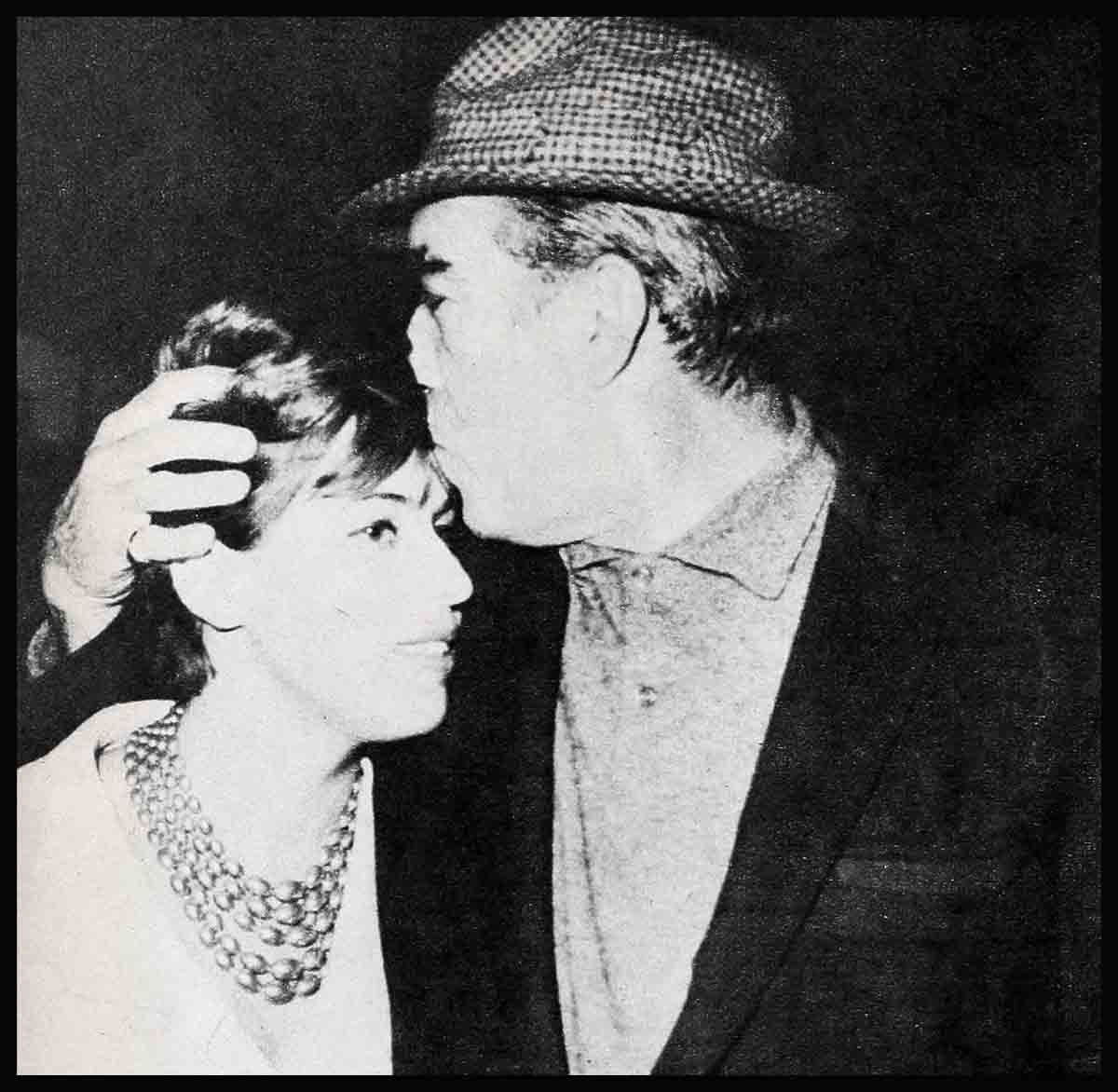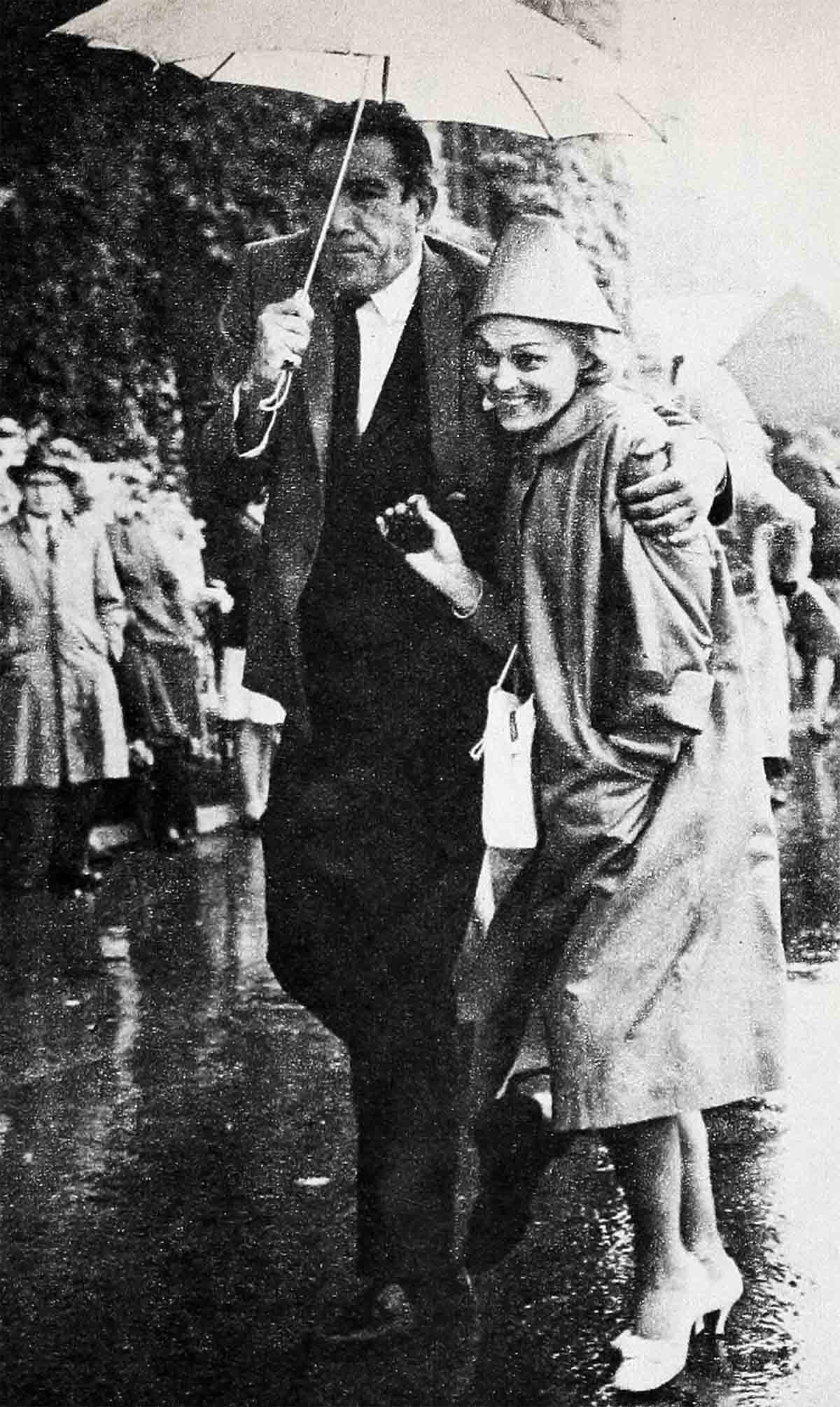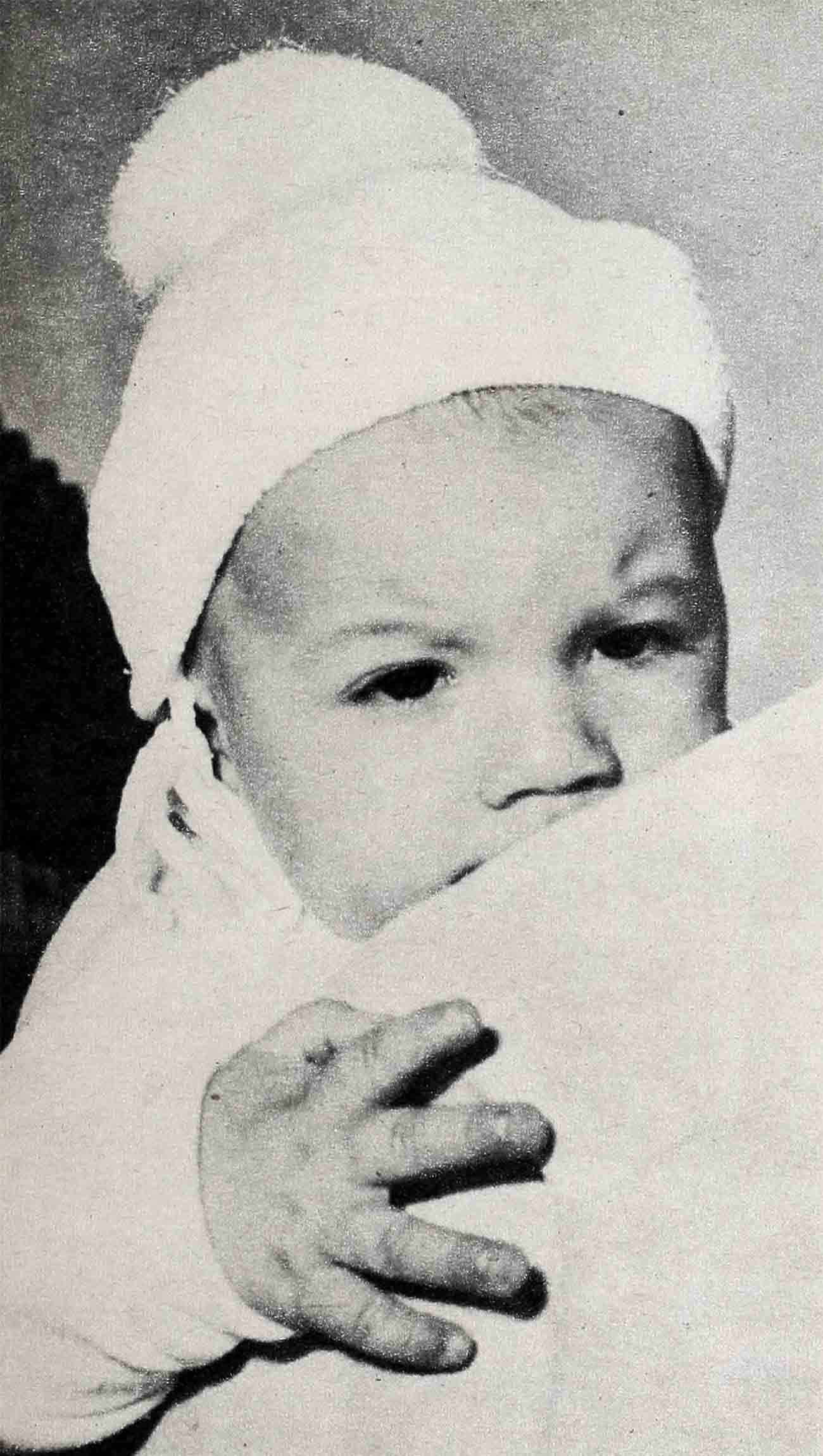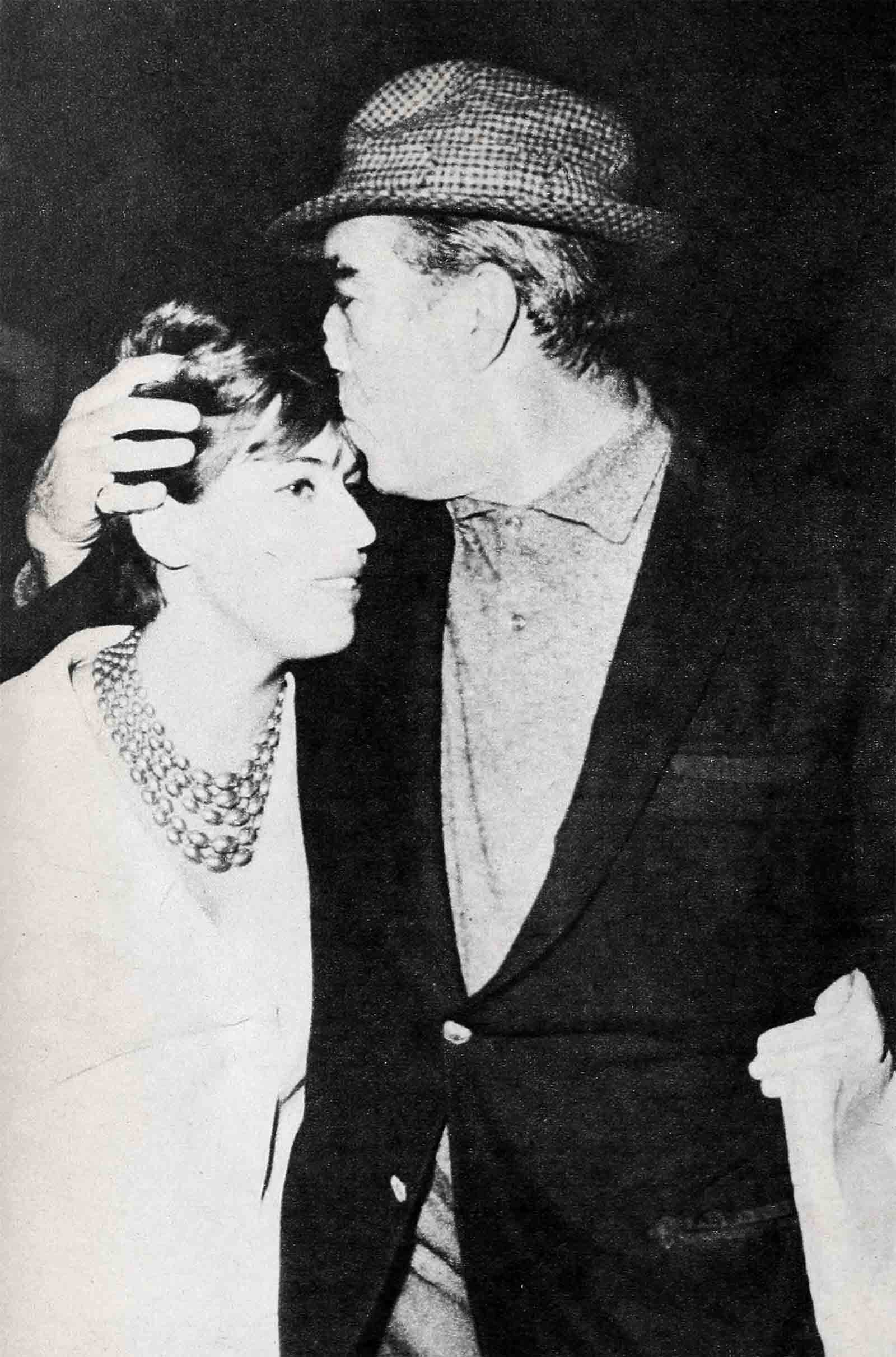
Anthony Quinn: “I Must Be Free To Marry The Mother Of My Child!”
“I must be free to marry the mother of my child!” Anthony Quinn’s face was somber. There were tears in his eyes. I didn’t need my glasses to see that the rugged, forty-eight-year-old star was suffering deeply. His big, dark, Mexican-Irish body was slumped dejectedly. I had come to talk to him on the set, in Paris, where he was starring with Gregory Peck in “Behold A Pale Horse.” I beheld a very distraught man.
Nine months ago, Tony Quinn became the out-of-wedlock father of a son, Francesco Daniele. The mother is Jolanda Addolori, an attractive under-thirty Venetian whom Tony first met when she worked as wardrobe woman in his “Barrabas” epic in Rome. After that, he took her to the deserts of Jordan as his secretary when he was playing a wild Sheik in “Lawrence of Arabia.” He found Jolanda sympathetic. First she became his secretary, then his mistress, then the mother of his child—and now he is anxious to marry her, to make her his bride.
“My wife Katherine must try to understand my need for Jolanda,” he stated with great earnestness. “I am a very vigorous man. I must have a woman who loves me in every way—physically, emotionally, intellectually. For the past four years I have been a very lonely man. In spite of all the homes I have possessed. I have lived alone most of the time.
“For twenty years my marriage with Katherine was good. But in the last five years she has been married to Moral Rearmament. I am a man who is of the earth, I need something more tangible than Moral Rearmament—I need a woman. I am at the best years of my life. I want to have many more children. I want to have them with Jolanda. My work is in Europe and my home must he in Europe. I am tired of moving, moving from place to place.”

“Everything in the open . . .”
At the time of going to press. Mrs. Quinn had agreed to a separation. But this is not enough for Tony.
“I do not like living with a woman to whom I am not married,” he assured me. “I want everything to be in the open. It is my sincere belief that the four children I have with Katherine will be hurt much less by all this if I can legalize my position with Jolanda and our son. I believe my four oldest children are now old enough to understand the situation. I wouldn’t hurt one hair of their precious heads. But I must also think of my new baby son. I must make him equal in law with my other children. (The Quinns had a fifth child, their first, who drowned as a baby many years ago. in a swimming pool tragedy.) And the only way Francesco can have my name legally is by my marrying his mother.
“I want respect for this woman,” Tony continued. “This is not an ordinary affair. This is not a romp. This is a woman I want for the rest of my life. I owe it to her to marry her. She saved my life when I was close to a complete nervous breakdown near the end of my play, ‘Tchin Tchin’ in New York. I would have gone completely under but for Jolanda. I love her. She has given me great comfort and happiness. I can never return to my previous life. I don’t want to hurt Katherine. She’s a fine woman, but I am hoping she will see it my way and give me my freedom in law as well as in fact.”
This is not the first time that Tony has looked at a woman other than his wife. There were three others, to my definite knowledge. One was a blond young actress. I happened to be in the same hotel in the mountains near Hollywood. The girl looked guilty. Tony looked sheepish. Of course, I did not write about it—Tony was still presumably living happily with his wife. But I had lunch with the girl, and while we never mentioned his name, I told her, “You are too pretty and nice to waste yourself on a man who can’t marry you.”
“But I love him,” she protested, while agreeing with me about the marriage bit.
The liaison ended soon after, however. Not long ago I asked a friend of hers, “How did she end with Tony?” “She gave him up,” I was told. I wasn’t too surprised when my informant added, “She finally couldn’t take it. Also he was often very cruel to her.” Not fistically, I am sure, because while Tony is a huge man, he also has the physical gentleness of a big man.
Then there was a young brunette. In fact, Tony, like Richard Burton, is supposed to make a play for every lady he acts with.
There are some girls, I know, who escaped. Federico Fellini’s wife, Giulietta Masina, for one—Tony’s co-star in “La Strada.” Why am I so sure? Because Fellini directed the picture and he was on the set all the time. And Ingrid Bergman, with whom he is making “The Visit.” Ingrid used to fall in love with her leading man or director. But that was before she went outside of the cast to Rossellini. And all that is behind her, anyway. She is very happy, I am told, in her marriage with Swedish Lars Schmidt.
Question: How did Jolanda succeed in making Tony want to marry her where all his previous romances failed? I believe it is the fact of his new fatherhood. And the fact that he is approaching the danger age of fifty. So many men, especially today. it seems, want to relive their youth with a younger woman. I believe that Governor Rockefeller was married for thirty-one to the Quinns’ twenty-five years. And the divorcing Henry Fords have two daughters in their twenties.
And the new bride usually resembles the old. Mrs. Happy is a dead ringer for the first Mrs. Rockefeller. Jolanda is Italian. The former Katherine DeMille is part or wholly Indian. (She was adopted by Cecil B. DeMille when she was a baby.) The two women look quite a lot alike, although Katherine’s once dark hair is generously sprinkled with gray.
But who is to judge the foundering of any marriage, or the needs of the husband or wife who wants to break the bonds?

A restless, searching man
I have known Tony ever since we both arrived at Hollywood more or less at the same time. He was always restless, always seeking something beyond the visible. He was a great dancer in those early, slim days, and Warners, the studio where I first saw him, used him in musicals. We talked of dancing, which I have always loved, and Tony promised to teach me to tango. And that really does take two people, as he learned when he called me quite late one evening and suggested he give me some lessons. I tell you this little story to explain how well I know him. (By the way, I did not let him teach me to tango.)
But to be serious again, and this is a very serious matter with Tony: If he cannot marry Jolanda, I believe he will suffer terribly. The whole pattern of his life has been directed towards finding a secure harbor. This is why he keeps buying houses—he has a desperate desire to belong somewhere.
There is the twenty-acre estate in Connecticut, where Katherine now lives with two of the children. One daughter is in India on Moral Rearmament business. One is employed in an office in California.
I remember when Tony bought the house in the Pacific Palisades, some twenty years ago. It was a small house then, only two bedrooms. It grew bigger as his family arrived. “I will never ever sell it,” he assured me. “This home represents security for me, my wife and my children.” But he sold it.
The house in Ojai was to be the dream home for the Quinns. He employed a friend of mine to help with the plans and supervision. Tony was always working and he needed someone on the spot. Well, it started as a small weekend retreat, and by the time it was finished it was a huge mansion, the cost was in six figures and Tony ended his friendship with the “supervisor.” But Tony was responsible for the expensive additions, he wanted the whole world crammed inside the four outer walls.
Then the beautiful house in the fashionable East Sixties in New York. When I visited Tony there, a mere ten months ago, he seemed harassed but happy with the fact that, “For the first time in two years I can be at home with my family.” This was why, he told me, he had accepted the lead with Margaret Leighton in “Tchin Tchin.” It wasn’t a very good play and it did not last as long as the two stars had expected. Tony became ill and there was some disagreement with producer David Merrick. But I was unaware of the disagreement at home. The Quinns’ youngest daughter was practicing the piano in a far away room, A butler brought in tea and cakes, the rooms were rich with antiques, and every spare piece of wall was filled with paintings that Tony had collected all over the world wherever he had made his films.
Frankly, I was envious of the beautiful home. When I told this to Tony, he gave a deep sigh which should have alerted me to the fact that things weren’t quite what they seemed.
I was quite startled when he said, “I will probably have to sell it.”
“No, you mustn’t,” said I. “It’s too beautiful.”
“It’s also too expensive,” he replied somberly. But that, of course, was not the reason why he wanted to sell. He knew then that Jolanda’s baby was on the way. He knew he was going to leave his wife to live with the woman he loved. Recently the house was sold for $300,000—which I am sure Tony does not need. It is now the legation for one of the African countries. Tony kept his paintings. The furniture went to Connecticut with Katherine. I was sad when I heard all his.
“Buck up,” I said to myself, “Tony will buy another house.” I believe he has, in Rome, where he intends to live with Jolanda, although he will still be roaming around the world to make pictures. He also owns a big piece of land on the Island of Rhodes near Greece. He couldn’t resist buying it when he was there a couple of years ago filming “Guns Of Navarone.” He didn’t need it, but the desire to belong wherever he goes, brought out the checkbook. Ah, well, he can always use the land for a painting trip. He’s a very good artist in his own right.

Too much success?
Where did it start to go wrong? Sometimes too much success is hard to take, especially in marriage. Tony was ambling along happily enough until his big hit in 1956, in “La Strada.” Oh, he had made some good pictures before. In fact, he had won two Oscars for “Best Supporting” roles—in “Viva Zapata!” and in “Lust For Life” as the painter Gauguin. And one nomination for “Best Actor” for his performance in “Wild Is The Wind.” But “La Strada” was a tour de force. Tony leaped out of the character category. He was a star, and his salary shot sky high, although he had made this picture for peanuts because he believed in the story. And this is the clue to the man. He believes in gambling on what he thinks is right.
And he will be the first to admit that a gambler sometimes makes mistakes, although he seems so sure now that he is doing the right thing. Perhaps his first real gamble was in marrying Katherine. Tony never seemed too comfortable with his film tycoon father-in-law, Cecil B. De Mille, for whom he played his first movie part as an Indian in “The Plainsman.” He was playing another Indian for C.B. in the first version of “The Buccaneer” when he met Katie, and it was love at first sight.
“I was amazed,” Mrs. Quinn related later. “He had only gone to the ninth grade, but he knew more about painting and books than anyone I’d ever met.”
They were married October 21. exactly three weeks after they were first introduced. Tony Quinn’s Mexican mother attended the fashionable ceremony at the Episcopal Church in Beverly Hills. They are not Catholics, although this has been given as the reason for Katherine’s reluctance to divorce Tony.
“We have no real religion,” Tony has said. “We have just brought up the children to do unto others as they would be done unto themselves.”
And now Tony does not want to do unto his small son as it was done to him. “I want my son to have the love and care I was denied,” he says. “My father was away fighting when I was born in Mexico, during a revolution.” This was a real omen of the stormy life the dark-eyed newcomer was to lead. When he was five-and-a-half weeks old his mother, says Tony, carried him five hundred miles on her back to El Paso, Texas, where she obtained a job in a store. His father joined them when the boy was four, and the whole family worked the orchards in northern California. At ten, Tony became the sole support of his family when his father was killed in a car accident.
It was a rough life for them. A one-room shack, with Tony quitting school periodically to dig ditches and do other lowly jobs. And bucking the local prejudice against Mexicans. The Irish in him is in his great sense of humor. His face, with its dark eyes and brows, his low hairline and swarthy skin, is pure Mexican.
Naturally, it was a woman who had the first important influence on his life. He was seventeen when he met attractive, redheaded Elsie Tonge through her daughter. Mrs. Tonge introduced him to books, to Shakespeare. Until that time, Tony had never even heard of the Bard. He was so bothered by the fact that he could not join in the conversation about Shakespeare that he fled to the kitchen and downed a whole bottle of cooking sherry. Then he came back into Mrs. Tonge’s living room and spouted his own version of “King Lear.” “You have talent.” his patroness told him. He started to read and he wanted to act. But first he underwent an operation for an impediment in his speech.
He is fiercely proud. At the beginning of his acting career in Hollywood he turned down a $150-a-week contract from Mr. DeMille because he didn’t want to be known as “C.B.’s son-in-law.” Only two years before the great director died, Tony felt he had made it so much on his own, that he could accept the directorship of the re-make of “The Buccaneer.” “But only on condition that you do not interfere,” he told his father-in-law. And so it was, and I wish I could say that the film was a success. It was not.
At the beginning of their marriage. Katherine minimized her own acting career to help and advise her husband. In 1946, she gave it up entirely. And she was ready, as always, to pack and go where Tony wanted to go. One day in 1947, he came home and told her, “I’ve had enough of Hollywood and films. We’re going to New York where I shall learn to be a real actor.” He did, in “A Streetcar Named Desire.” In 1951, Katie packed again when Tony decided to move back to Hollywood. And she packed again when he decided to live in Rome. When he left for Europe three years ago, Katie stayed behind. Tony had not asked her to accompany him. When the baby boy arrived last March, she packed a small suitcase and flew to Italy to discuss what had to be done. Tony did not ask her for a divorce, then. He thought he could manage with a separation.
But you grow to love a baby, and you grow to love the woman who gave birth to your baby. And that is when Tony cried. “I must be free to marry the woman I love.” It now rests with Katherine.
THE END
See Anthony Quinn soon in “Behold a Pale Horse,” Col. His next will be “The Visit.”
It is a quote. PHOTOPLAY MAGAZINE DECEMBER 1963





No Comments